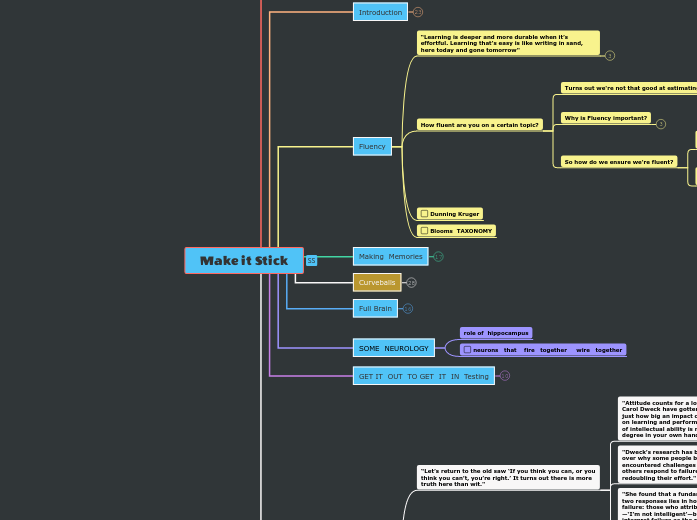Make it Stick
Main topic
Introduction
Fluency
“Learning is deeper and more durable when it’s effortful. Learning that’s easy is like writing in sand, here today and gone tomorrow"
How fluent are you on a certain topic?
Turns out we're not that good at estimating this..
When we re-read something it gives us a feeling of 'familiarity' that can often mask as fluency!
But when it comes time to take action on a certain piece of information we need to be FLUENT not FAMILIAR..
Why is Fluency important?
So how do we ensure we're fluent?
Start by throwing away most of the study practices that are so common..
Then we're going to add in some of the practices inside this book!
These practices end up being more energy and attention demanding..
But they lead to real brain changes vs temporary learning!
Dunning Kruger
Blooms TAXONOMY
Making Memories
Curveballs
Full Brain
SOME NEUROLOGY
role of hippocampus
neurons that fire together wire together
GET IT OUT TO GET IT IN Testing
Mindset
“Let’s return to the old saw ‘If you think you can, or you think you can’t, you’re right.’ It turns out there is more truth here than wit."
"Attitude counts for a lot. The studies of psychologist Carol Dweck have gotten huge attention for showing just how big an impact one simple conviction can have on learning and performance: the belief that your level of intellectual ability is not fixed but rests to a large degree in your own hands."
"Dweck’s research has been triggered by her curiosity over why some people become helpless when they encountered challenges and fail at them, whereas others respond to failure by trying new strategies and redoubling their effort."
"She found that a fundamental difference between the two responses lies in how a person attributes their failure: those who attribute failure to their own inability—‘I’m not intelligent’—become helpless. Those who interpret failure as the result of insufficient effort or an ineffective strategy dig deeper and try different approaches.”
Want to increase your abilities?
Change your mind first.
What are your thoughts on your own abilities?
But there we have it.. Want to know what I think the number one factor in learning ability is?
The believe that you can do it!
PS. A lot of my coaching clients come to me for help with procrastination.. Mindset plays a big part there too!
Motivation is a function of wanting something AND believing that you can achieve it.
